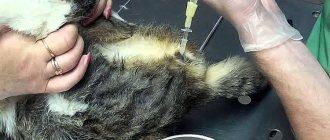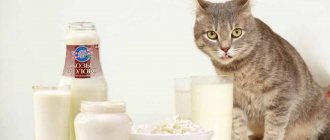7038Pavel
1
The kitten is the cheerful and cutest resident in the house. How interesting it is to watch him play, grow and become an important cat. But along the way there are a variety of obstacles in the form of nutrition and development issues. Proper nutrition for a kitten is the key to its survival and growth into a gorgeous pet. Therefore, among the usual questions, the leader invariably is: “can kittens have sour cream?”, because they lick it so funny and then lick it for a long time. Caring owners are interested in whether kittens can be fed this product, how often and at what age, so as not to cause harm.
Benefits and harms for cats
Although there is an opinion that sour cream and milk are very useful for cats, this is not entirely true. It all depends on the volume, fat content and quantity of the product consumed. Milk and fermented milk products contain a large number of useful components:
- amino acids;
- microelements;
- fatty acid;
- lactose;
- animal protein.
Dairy products help the animal stay active.
The calcium contained in milk is the foundation for the growth and strength of bones, teeth and nails. Dairy products are a source of energy in the life and development of a kitten. Many veterinarians advise adding fermented milk products to a cat’s menu from a young age. It is recommended to give kittens milk diluted with water. Feed should be from a pipette or syringe in small portions.
For adults, preference should be given to fermented milk products. This is due to the fact that milk contains lactose. In mature cats it can cause diarrhea, colic and bloating. Such milk products as: well regulate the digestion process and increase immunity:
- kefir;
- curdled milk;
- fermented baked milk;
- sour cream;
- serum;
- low-fat cottage cheese;
- yogurt.
The harm of sour cream
If it is given in large quantities, it sometimes disrupts the functioning of the liver and pancreas. Especially fatty product. Such foods have a negative impact on the digestive system. An additional disadvantage is that frequent consumption of soft foods leads to the formation of tartar. The pet does not need to chew or gnaw, so it will increasingly begin to prefer soft food.
Sour cream will be harmful to the animal if it has lactose intolerance. In this situation, milk sugar is not absorbed by the body. Therefore, it should be completely excluded from the menu. Fermented milk products are distinguished by their fermentation properties. During this process, lactose is converted into lactic acid. If a cat has an intolerance to it, this can provoke an allergic reaction (even death).
It should be remembered that artificially bred cat breeds have sensitive digestion. Therefore, fermented milk is given to them with great caution. The product can be added to porridges, soups, and boiled eggs. It is not given to cats with dysbacteriosis, during exacerbation of gastrointestinal pathologies. If a cat develops diarrhea after eating it, the food is temporarily removed from the diet. When the stool is restored, you can give it again. However, when diarrhea occurs, it is completely excluded from the diet.
Is it possible to give sour cream?
This product helps reduce aggression in animals.
All fermented milk products are beneficial for cats within reasonable limits. Sour cream contains many useful substances, vitamins and amino acids. Thanks to these components, pets' fur becomes fluffy and shiny. The cat's body copes with various diseases more easily. Sour cream relieves nervousness and aggressiveness well, acting as a sedative.
You can feed cats this product, but some nuances should be observed:
- Sour cream should not be too greasy. If you use homemade sour cream, it should be diluted with whey or low-fat kefir. The consistency should not be too thick or thin to make it comfortable for your pet to lick.
- Purchased products cannot contain more than 10% fat content. Excess fats negatively affect the animal's liver and digestive system.
- You need to give a little, no more than 1-2 tsp. If the kitten licks the treat with pleasure and begs for more, you can treat it only 2 times a week.
Veterinarians remind that all food offered to your pet must be fresh. If for some reason sour cream is replaced with yogurt, cottage cheese, or simply introduced into the diet, then take products without additives and flavorings.
The benefits of sour cream for cats and kittens
- Like other dairy products, sour cream is a source of calcium, amino acids, vitamins and many nutrients.
- Calcium is responsible for the proper development of the skeletal system and supports the growth and strength of teeth, nails and bones.
- Amino acids and vitamins strengthen, stabilize the functioning of the entire body, and also improve the skin and hair of your four-legged friend.
How to properly feed a cat sour cream?
- Fermented dairy products can be fed to pets on a daily basis.
- The serving for a kitten should not exceed 20 grams per day.
- Adults can be given 50-100 g of sour cream daily.
- It should be remembered that the fat content of sour cream is best adjusted to 10%.
- Sometimes it is advisable to replace this product with fermented baked milk, kefir, cottage cheese, yogurt, whey, and unsalted cheese.
- If your kitten doesn't like sour cream, you should mix it with foods that he likes.
- This is done at least twice a week.
- Sour cream can also be diluted with water.
- All food products are introduced into the diet gradually.
- When introducing a new food, you must closely monitor the animal's health and well-being.
When should a cat not eat sour cream?
- An animal that eats dry food should not eat sour cream.
- A carefully selected food composition completely saturates and provides all the necessary substances and microelements for the pet’s body, so an additional fermented milk product can cause digestive problems.
- You should not give sour cream to such cat breeds as Persian, Angora, and British.
- There is individual lactose intolerance. Plus, lactose is not digested by the digestive system. In this case, the use of milk should be completely avoided.
- In fermented milk products, a fermentation process occurs and milk sugar is converted into lactic acid. For this reason, even if you are lactose intolerant, you can consume fermented milk products.
Choose your kitten's food responsibly and carefully. It is through a balanced diet that your kitten gets all the vitamins, minerals and nutrients he needs. Thanks to professional advice, you will raise a healthy, beautiful and smart kitten.
See also: nicknames for ginger cats and male cats
Restrictions
If an animal constantly eats such a product, this can lead to the formation of tartar.
When feeding cats sour cream, you should follow the norm. All fermented milk products have a soft consistency. Therefore, your pet does not need to chew this food. Frequent or constant consumption of such food leads to disturbances in the chewing functions of the jaw and the appearance of tartar. As a result, the cat may become lazy and stop eating solid food.
Some owners prefer to feed their pets prepared food. In this case, dairy products, including sour cream, cannot be introduced into the diet. This can harm the animal, since in such food all components are balanced. The amount of vitamins, minerals and nutrients is carefully calculated. Violation of these proportions, when the cat has also eaten sour cream, threatens with indigestion and stool problems.
Persian, Angora and British cats should not be given sour cream, even if they eat it with pleasure. Veterinarians claim that their delicate bodies do not cope well with this product. Diarrhea occurs and your health deteriorates greatly. It is better to replace sour cream with low-fat cottage cheese or yogurt. The one-time dose is 30 g. You can give it to your cat once a week, even if he actively and happily eats the treat.
Content
1. How to give sour cream to a cat
Cats love milk and sour cream - everyone knows this. What village cat would refuse a saucer of homemade treats? But when asked whether cats can be given sour cream, veterinarians are in no hurry to answer in the affirmative. Why?
Useful properties of sour cream
Sour cream is a fermented milk product that is made from cow's milk using lactic acid fermentation, a process involving special bacteria. People have been eating it for a long time, adding it to first courses and salads. Pancakes, dumplings - everything becomes tastier with sour cream. And sour cream, like other dairy products, contains useful vitamins and microelements. Among them:
- animal proteins;
- fats;
- vitamins – group A, group B, C, D, E, H, PP;
- micro- and macroelements – calcium, magnesium, potassium, iodine, zinc;
- organic acids.
All these nutrients and beneficial substances have a beneficial effect on the body. Protein is the main source of energy and helps support the immune system. But the fat content in sour cream can vary. On sale you can find sour cream of different fat content - from 15% to 25%, as well as low-fat. The latter contains all the nutritional elements, but it does not contain saturated fatty acids, which negatively affect the condition of the heart and vascular system.
Sour cream contains cholesterol, which is involved in the process of cell formation and hormone production. However, we must not forget that elevated cholesterol levels in the blood can lead to blockage of blood vessels.
Among the minerals contained in sour cream, the first place in quantity belongs to calcium. The microelement, which is found in milk, cottage cheese, yogurt, kefir, is necessary for bone health, normal functioning of the heart and nervous system. Calcium promotes the growth and strengthening of the cat's bones and teeth. Phosphorus, which can also be found in sour cream, also supports the health of joints, nervous and muscular systems, as well as kidneys.
Fermented milk product contains vitamins important for the health of the body. First of all - group B. Riboflavin - vitamin B2 - promotes normal carbohydrate and lipid metabolism and the absorption of vitamin B6. Food products contain little riboflavin; it is not produced in the body; the more valuable the fermented milk product is as a source of useful vitamin. Riboflavin is needed:
- for the production of red blood cells;
- functioning of the nervous system;
- maintaining heart muscle health;
- visual acuity;
- attractive appearance of the pet - healthy skin and coat.
Important!
A deficiency of vitamin B2 in the body can cause metabolic disorders, anemia, and mental health problems in cats.
Other vitamins are no less important. In particular, vitamin B12 supports the health of the nervous system, strengthens the immune system, and vitamin A ensures the visual acuity of a night hunter and has a positive effect on the beauty of the cat’s coat.
Sour cream is much easier to digest by the body than milk. It has a positive effect on the intestinal microflora. But if it contains so many useful substances, does that mean you can give it to your pets without fear? Not everything is so simple, veterinarians say.
Why sour cream is harmful for cats
First of all, due to the high fat content in the fermented milk product. Sour cream is high in calories, 100 g of a 15% fat product contains 159 calories, so it is not recommended to give it to animals with excess weight problems. Due to the high fat content of food, your pet may have problems with the pancreas and liver. Kittens produce enzymes in their bodies that are capable of breaking down lactose from milk and dairy products; adult animals do not have them, so both whole milk and products made from it are poorly absorbed by the body and often cause digestive disorders.
Cats may like the soft consistency of sour cream, but it is a problem for their teeth. The food does not require thorough chewing, which over time can make your cat reluctant to eat solid food. In addition, it can lead to the formation of tartar. Therefore, you can give your cat sour cream only in limited quantities and infrequently - only as a treat.
Xylitol, sugar
Cats do not have a sweet tooth by nature: they have few receptors on their tongues that distinguish sweet taste. And they simply cannot digest fast carbohydrates, much less sweeteners.
A cat may eat chewing gum or candy out of curiosity.
Sweet foods lead to diabetes. Xylitol is even more insidious: it causes the release of insulin, and blood glucose levels drop sharply. This leads to seizures and coma.
Caries is nonsense, cats are not afraid of it. But absorbing sugar is not an easy task.
Cake? No, I didn’t see it!
Harm of fermented milk product sour cream for cats
A large amount of fatty sour cream for a cat can, as they say, disrupt the pancreas and cause serious liver dysfunction. Adult cats, unlike kittens, no longer have special enzymes that fully break down lactose from consumed dairy products, as a result of which, consuming this product can also cause dysfunction of the animal’s digestive system.
Soft in consistency, sour cream does not require thorough chewing, which means that its frequent use can cause tartar and problems with the cat’s chewing apparatus. Since cats are predators by nature, the load on the functionality of their jaw is significant, so frequent consumption of foods that do not require chewing can lead to the cat simply being lazy and eating hard food.
Why do cats love sour cream?
In folklore, these graceful creatures always, from just the sight of the product, come into indescribable delight. But in reality, not all cats have tender feelings for sour cream.
Most likely, this product attracts people with its delicate consistency and pleasant aroma. Don’t discount the reason why some cats are fascinated by sour cream, which is associated with pleasant associations from childhood. All kittens in infancy fed on mother's milk, which is quite fatty in consistency and can resemble cream or sour cream.
How to give sour cream to cats
Fermented milk products can be given to pets daily. The serving for kittens should not exceed 20 grams per day. Adults can be given 50-100 g of fermented milk every day. Please note that it is better to choose a fat content of sour cream up to 10%. It is advisable to sometimes replace this product with fermented baked milk, yogurt, kefir, cottage cheese, yogurt, whey, and unsalted cheese.
If your kitten doesn't like sour cream, then you should mix it with foods that he likes. This is done at least twice a week. At the same time, it can be additionally diluted with water.
All products are introduced into the diet gradually. When introducing new food, you should carefully monitor the health and mood of your pet.
When not to eat sour cream
An animal that eats dry food should not be given sour cream. The carefully selected composition of the feed completely saturates and provides all the necessary substances and microelements, so an additionally introduced fermented milk product can cause digestive upset.
You should not give sour cream to the following breeds of cats: Persian, Angora, British.
There is individual lactose intolerance. In this case, milk sugar is not absorbed by the digestive system. In this case, the consumption of milk must be completely avoided. Fermentation occurs in fermented milk products and lactose is converted into lactic acid. For this reason, even if you are lactose intolerant, you can eat fermented milk products.
Responsibly and carefully plan your kitten's diet. After all, it is from properly balanced food that the animal receives all the necessary vitamins, minerals and nutrients. By following all the recommendations and advice of experts, you will raise a healthy, beautiful and smart pet.










